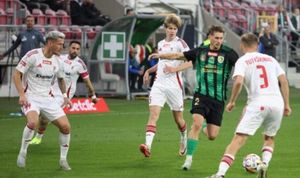On the third anniversary of Russia's invasion of Ukraine, European leaders gathered in Kyiv to reaffirm their commitment to supporting the war-torn nation. The visit featured key figures such as EU Commission President Ursula von der Leyen and EU Council President António Costa, who emphasized the shared fate of Ukraine and Europe.
During the significant summit, von der Leyen remarked, "We are here today because Ukraine is Europe," highlighting the deep connection between the two entities. She stressed the impact of the Russian aggression, stating, "This survival struggle is about Europe’s destiny, not just Ukraine’s." The meeting, organized by Ukrainian President Volodymyr Zelenskyy, saw several international leaders pledge both financial and military support.
New financial measures were announced, with von der Leyen confirming the European Union would provide a fresh assistance payment of 3.5 billion euros. This aid aims to bolster Ukraine’s strained budget and assist with military procurement, part of the EU’s broader commitment of 134 billion euros to Ukraine since the conflict began. The funds are part of the Ukraine Assistance Facility, which plans to expedite arms production and expand defense capabilities across Europe.
EU officials are particularly alarmed by shifting US policies, especially after indications from former President Donald Trump about significantly reducing military aid to Ukraine. At the summit, Costa expressed optimism for Ukraine’s future, stating, "The future of Ukraine is in the European Union. And the security of Ukraine is the security of Europe." This sentiment reflects Europe’s wider strategic imperative to align its security with Ukraine's stability.
While EU support may seem assured, the urgency of increased military assistance is underscored by continued Russian advances. Von der Leyen acknowledged these challenges, urging, "We must speed up the immediate delivery of weapons and ammunition. And this will be at the heart of our work in the coming weeks." With pressure mounting, European capitals are counting on swift action to combat Russian military operations.
Simultaneously, the EU foreign ministers met in Brussels to finalize the 16th sanctions package against Russia. This latest round includes measures such as import bans on materials like aluminum and enhanced restrictions on Russian financial institutions. Kaja Kallas, the EU’s High Representative for Foreign Affairs, emphasized the importance of these sanctions, stating, "Every sanction package deprives the Kremlin of resources it needs to continue this war."
With their collective stance, EU leaders aim to demonstrate not only solidarity with Ukraine but also their resolve against the Kremlin’s aggressive posturing. "A free and sovereign Ukraine is in the interest of the entire world," von der Leyen reiterated, as EU heads of government prepare for upcoming engagements to discuss strategic responses.
On social media, Zelenskyy honored the resilience of his nation, noting, "Three years of resistance. Three years of gratitude. Three years of absolute heroism of the Ukrainians." His comments resonate across Europe, where public and political support for Ukraine remains strong as the conflict drags on.
The potential shifts in the geopolitical arena, particularly the rising dialogue between Washington and Moscow, present new challenges for Europe. Amid speculation about Trump’s negotiation tactics, which critics argue may leave the EU sidelined, there remains clarity within European institutions. They will not pause their support for Ukraine, nor will they compromise their principles.
On the anniversary of the invasion, the EU leaders delivered a clear message: They will continue to stand by Ukraine. The European Commission is focused on enhancing Ukraine’s integration with the EU, with plans for the complete inclusion of Ukraine and Moldova's electricity markets by year-end as part of strengthening ties.
This steadfastness encapsulates the EU's commitment on this poignant anniversary. The declaration of joint support, marked by the overarching narrative of shared struggle and resolve, aims to assure Ukraine and the broader community of democracies: the flow of support and solidarity will continue as the war festers. If anything, the resolve is now more pronounced as global observers watch the interaction between the US and Russia, waiting to see how these dynamics will impact the continent’s future.



